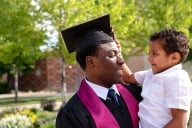You have /5 articles left.
Sign up for a free account or log in.
To hear David M. Mellott tell it, the field of theological education is in a period of "tremendous change."
The student population is becoming more diverse, with more Black and Latinx students enrolling. Fewer students are enrolling in master of divinity degree programs in favor of shorter (and less expensive) master of arts degrees. The job market for graduates is changing, with more ministerial positions being part-time. Support from many denominations for students to complete the M.Div. is declining.
“Everybody is challenged when you think about the fact we’re going to ask somebody to do a degree that could take them anywhere from three to six years to complete, come out with some student debt, maybe a lot of student debt, and then go into a ministerial assignment that is part-time,” said Mellott, president of Christian Theological Seminary in Indiana.
What's more, the seminaries have been facing their own challenges, many of them financial. At least 32 theological schools have merged and 11 have closed since the Great Recession of 2008-09, according to the Association of Theological Schools, a membership organization and accreditor.
A new podcast series produced by Christian Theological Seminary is exploring the impact of these demographic and economic trends on theological institutions.
“The change in the racial diversity of the seminary, which has been a really good thing, has also increased the expectation on seminaries to really rethink how they teach theology and what they teach and the narrative of Christianity that they tell,” said Mellott, who is co-hosting the podcast. “There’s a tremendous amount of pressure and change happening when it comes to the actual content of theological education. Then you add online education.
“The students are changing, the classrooms are changing, the financial structure is changing,” he said. “I would say even the social context in which we do theological education is changing. We’re in a very highly politicized environment where there’s greater awareness about racial injustice, injustice against people who are LGBTQIA, greater anti-Semitism. All of these realities I think are really creating a different or a heightened context for the work of theology. I’m not grateful for the problems, but I am grateful that seminaries are really wrestling with how are we going to take this seriously and -- this is my commentary -- to what extent has Christianity actually contributed to the problem?”
In the six-part series, which will be released every Tuesday through the end of February, Mellott joins with Deborah Mullen, professor emerita at Columbia Theological Seminary, in Georgia, in hosting conversations with leaders in theological education about a range of topics, including student diversity, interfaith education, faculty formation, changing religious affiliations of Americans and recently revised ATS accreditation standards.
“Schools are at a period right now where they really have to innovate,” said Frank Yamada, the president of ATS and a guest on one of the episodes. “They need to attend to doing this with the kind of quality we expect from the accrediting side, but they have to innovate and change what they do because the environment is changing -- not just the environment of higher ed but the environment the church, if you’re in a Christian tradition.”
Yamada said enrollment at ATS institutions has been declining or flat since 2005.
“That is a snapshot of our industry,” he said. “A lot of people are blaming COVID on a lot of things, threats to enrollment or to finances, but the reality of it is that these kinds of declines have been happening for quite some time.”
The podcasts are the outgrowth of a 2017 Henry Luce Foundation grant, led by Mellott and Mullen, which funded the convening of a three-year study group focused on future directions of theological education.
"We met six times over three years in six different locations that were adjacent to but not necessarily central to the traditional theological schools," said Mullen, who in addition to being faculty emerita at Columbia Theological Seminary also held roles as dean of faculty and vice president for diversity, equity and inclusion. "We intentionally were looking around the edges, believing that the lament that Christianity is on the decline in the U.S. -- although quite true -- doesn’t mean that it’s declining equally everywhere. My own experience in seeing the vitality of faith and religious expression and church life in places like the African American community and Latinx community led me to really believe there’s a lot of theological education going on, but it’s not exactly in the gaze of the dominant institutions."
Despite the challenges facing the traditional theological schools, Mullen said one of the themes running through the podcast series is optimism.
“I’ve been in theological education for 30 years,” she said. “It’s been an amazing professional journey, but so much of that has been handwringing, and one of the themes that came through our seminars as well as the six podcasts we have done so far is an optimism. It’s not disconnected from reality, but it is a sense that where we have been is not where we are, nor is it where we’re going, and as long as there are people of faith there will be ways that communities discover to raise up leaders and form leaders and form the next generation.”








